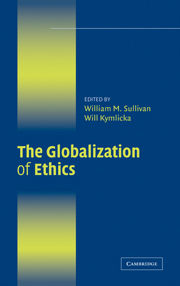Book contents
- Frontmatter
- Contents
- Contributors
- Acknowledgments
- 1 Introduction: The Globalization of Ethics
- 2 Global Ethics and the International Law Tradition
- 3 Morality and Universality in Jewish Thought
- 4 Globalization and Christian Ethics
- 5 Buddhism and the Globalization of Ethics
- 6 Muslim Perspectives on Global Ethics
- 7 Confucianism: Ethical Uniformity and Diversity
- 8 Natural Law, Common Morality, and Particularity
- 9 Liberalism and the Globalization of Ethics
- 10 Feminist Perspectives on a Planetary Ethic
- 11 Ethical Universalism and Particularism: A Comparison of Outlooks
- Appendix: Key Documents on Global Ethics
- Bibliography
- Index
8 - Natural Law, Common Morality, and Particularity
Published online by Cambridge University Press: 03 September 2009
- Frontmatter
- Contents
- Contributors
- Acknowledgments
- 1 Introduction: The Globalization of Ethics
- 2 Global Ethics and the International Law Tradition
- 3 Morality and Universality in Jewish Thought
- 4 Globalization and Christian Ethics
- 5 Buddhism and the Globalization of Ethics
- 6 Muslim Perspectives on Global Ethics
- 7 Confucianism: Ethical Uniformity and Diversity
- 8 Natural Law, Common Morality, and Particularity
- 9 Liberalism and the Globalization of Ethics
- 10 Feminist Perspectives on a Planetary Ethic
- 11 Ethical Universalism and Particularism: A Comparison of Outlooks
- Appendix: Key Documents on Global Ethics
- Bibliography
- Index
Summary
What a Natural Law Theory Claims
My aim here is to provide an account of how an adherent of the natural law tradition should approach the topic of the desirability of a uniform planetary ethic.
The term ‘natural law theory’ is notoriously slippery, and there are uses of it that are so broad as to fail to distinguish it from a variety of moral views (for example, utilitarianism, Kantianism) with which it is customarily taken to compete. While much is controversial about the definition of ‘natural law theory,’ it is not controversial that Thomas Aquinas is the paradigmatic natural law theorist, and that there are certain general features of Aquinas's view that structure his ethical thought. So I will take these features of Aquinas's view to be what distinguishes natural law theory from other moral views. What are those features?
For Aquinas, natural law can be examined from the ‘God's eye’ and the ‘human's eye’ points of view. When we focus on God's role as the giver of the natural law, the natural law is just one aspect of divine providence. When we focus on the human's role as recipient of the natural law, the natural law constitutes the principles of practical rationality, those principles by which human action is to be judged as reasonable or unreasonable.
I will here put to the side Aquinas's emphasis that the natural law is tied to divine providence, instead focusing on the natural law as the basis of practical reasoning.
- Type
- Chapter
- Information
- The Globalization of EthicsReligious and Secular Perspectives, pp. 134 - 150Publisher: Cambridge University PressPrint publication year: 2007



